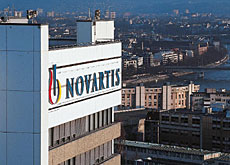Roche profit doubles on cancer drug sales

Net profit at the Swiss pharmaceutical firm, Roche, more than doubled last year, driven by strong sales of cancer drugs.
Drug sales were up nine per cent – 12 per cent in local currencies – to SFr29.52 billion ($24.86 billion).
Roche’s bottom line was boosted to SFr6.6 billion by some exceptional items, such as the sale of over-the-counter brands.
But the world’s leading maker of cancer drugs still saw core net profit rise 41 per cent to SFr4.34 billion, compared with SFr3.07 billion in 2003.
“The outlook for continued growth is good, despite today’s challenging marketplace,” chief executive Franz Humer said at the company’s news conference on Wednesday.
Top-selling drugs were Avastin (for colon cancer) and Mabthera (for blood cancer). The former was developed by Roche’s American partner, Genentech.
Roche expects sales in 2005 to grow faster than the market overall. It said operating margins would probably be the same as last year despite a rise in launch and development costs. A patent on a key drug is also due to expire in 2005.
Prescription drugs
In recent years, Roche has divested businesses and over-the-counter drug brands – such as Rennie – to focus on prescription drugs and diagnostics.
The company managed to increase its prescription drug sales by 13 per cent to SFr21.
Chief executive Franz Humer says he expects Avastin to generate sales of SFr2 billion a year, following its approval in Europe on January 14. The drug has been selling well in the United States under the Genentech label – it chalked up sales of $200 million in the fourth quarter of 2004.
Roche’s three biggest cancer drugs came from Genentech, which became a partner of Roche in 1991. The US-based firm is the world’s oldest biotech company, and the partnership is seen as having been decisive in turning around Roche’s fortunes.
Cross-town rival Novartis reported its results on January 20. Profits were up 15 per cent on 2003 at SFr5.8 billion.
Bright future
Roche is focusing on cancer medicine after selling or spinning off such non-drug units as its flavours and fragrances divisions.
“He’s shaping Roche into a true pharma and diagnostic company,” said Daniele Scilingo, analyst at Zurich private bank Pictet & Cie.
The pharmaceutical company, which has benefited from an increasing demand for anti-cancer drugs, is now the worldwide market leader in the oncology field. In 2004 the Roche Group’s oncology portfolio earned revenues of SFr7.7 billion, a gain of 32 per cent.
Humer said that he was very pleased with the progress made in the fields of research and development.
“Very importantly for the future, we again scored major successes in bringing innovative new drugs to market, and in advancing the projects in our research and development pipeline,” he said.
“In the pharmaceuticals division we expect to file roughly 25 marketing applications over the next five years,” he said.
Humer said that with so many young products in the portfolio, Roche had one of the lowest exposures to patent expiries in the pharmaceutical industry.
swissinfo with agencies
Figures for 2004 (Roche Holding AG):
Sales SFr31.273 billion
EBITDA SFr9.566 billion
Dividend SFr2
Employees 64,703

In compliance with the JTI standards
More: SWI swissinfo.ch certified by the Journalism Trust Initiative










You can find an overview of ongoing debates with our journalists here . Please join us!
If you want to start a conversation about a topic raised in this article or want to report factual errors, email us at english@swissinfo.ch.